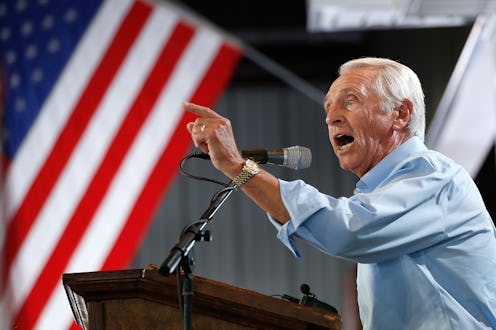News
The Democratic Response To Trump Needs A Change

The official Democratic response to President Trump's first joint congressional address, led by former Kentucky Gov. Steve Beshear, painted a very particular picture of the Democratic Party in the Republican-controlled era. Beshear's response highlighted the Democratic Party's concerns over the fate of the Affordable Care Act, as well as the Trump administration's immigration executive order. While this may have laid the groundwork for the Democratic opposition to Trump's policies, the face and tone of Beshear's speech did little to offer the fresh blood the Democratic Party so desperately needs.
Beshear — a white governor from Kentucky and self-described "small-town preacher's kid" — stuck to a traditional narrative that relied on his family's humble beginnings.
He put it to his viewers this way:
Look, I grew up in Kentucky in a small town called Dawson Springs. My dad and granddad were Baptist preachers. My family owned a funeral home. And my wife, Jane, and I have been married for almost 50 years. I became governor at the start of the global recession, and after eight years, we left things a lot better than we found them.
This type of narrative plays perfectly into just the type of voter the Democratic Party lost to Trump: the white, working class voter.
Even the audience that sat around Beshear ("at a diner, with some neighbors," as the former governor put it), reflected this kind of voter.
Appealing to this type of base may have worked in the Clinton and Obama eras, but an increasing number of Democratic officials are urging for a shakeup with their own party. This shakeup includes coalition building of minority voters — but there was no so talk during Beshear's official response.
While Beshear did lay out the specifics of what losing the Affordable Care Act would mean to millions of Americans, the consequences of that rollback were again hinged on this white, working class narrative.
"We sit in the bleachers with them on Friday night. We worship in the pews with them on Sunday morning," Beshear said. "They're farmers, restaurant workers, part-time teachers, nurses' aides, construction workers, and entrepreneurs working at high-tech start-ups. And before the Affordable Care Act, they woke up every morning and went to work, just hoping and praying they wouldn't get sick, because they knew that they were just one bad diagnosis away from bankruptcy."
The Democratic party needs to learn to put their desires in other, more inclusive terms. The white, working class vote (received or not) did little for them in the 2016 election, so perhaps it's time to change the Democratic response.